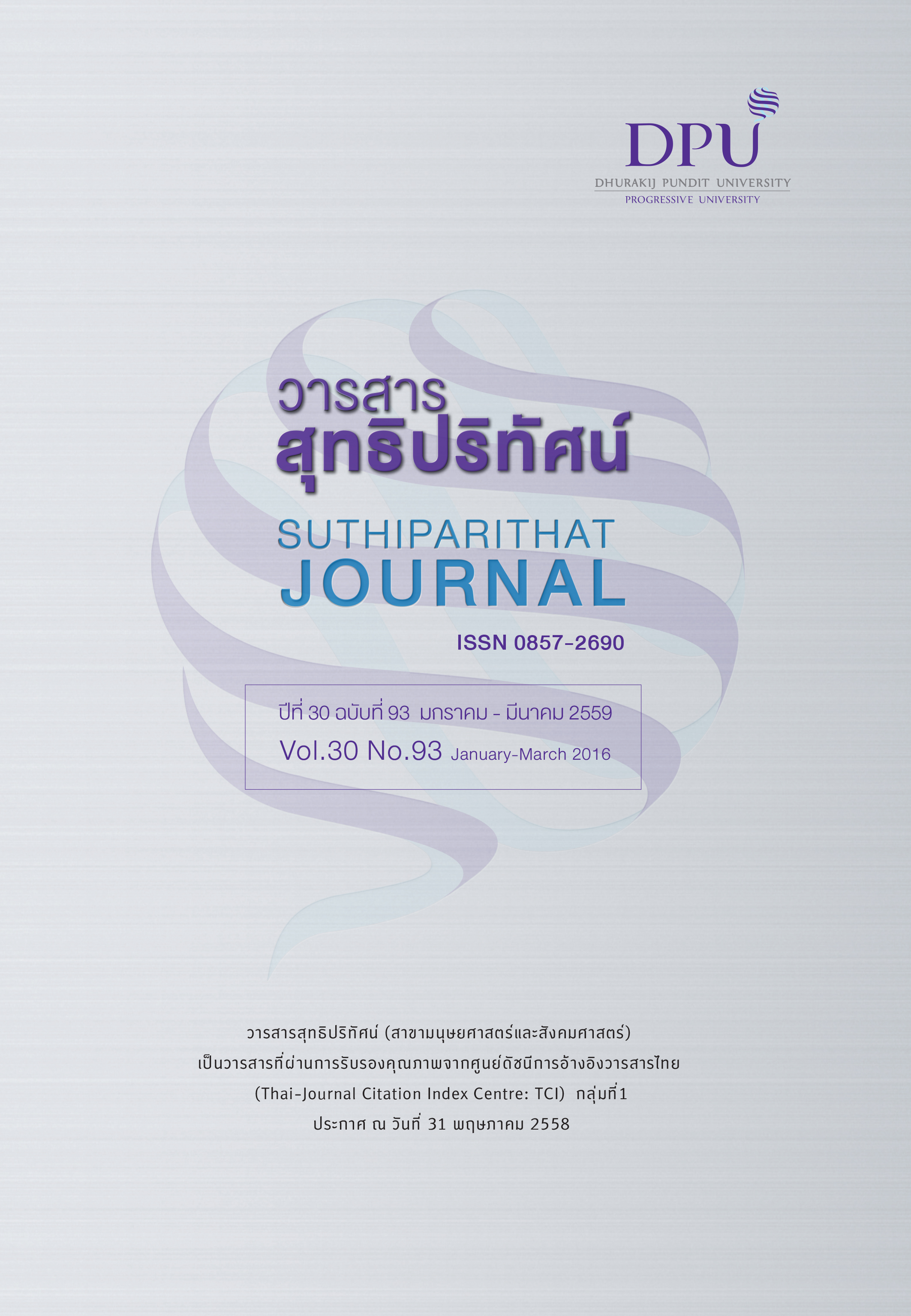BACKGROUNDS, CREATIVITY AND ADVERSITY QUOTIENT AFFECTING ENTREPRENEURIAL INTENTIONS OF BANGKOK UNIVERSITY UNDERGRADUATE STUDENTS
Keywords:
Backgrounds, Creativity, Adversity Quotient, Entrepreneurial Intentions, Undergraduate StudentsAbstract
The objectives of this research were (1) to study the effects of backgrounds (gender, entrepreneurial experiences, and parent’s entrepreneurship), creativity and adversity quotient on entrepreneurial intentions of undergraduate students and (2) to examine the effects of these three-aspect backgrounds on the students’ creativity and adversity quotient. The sample was 1,071 undergraduate students from Bangkok University selected by multi-stage sampling. The research instruments were questionnaires consisting of 4 parts: backgrounds, the creativity scale (α =0.892), the adversity quotient scale ( =0.872), and the entrepreneurial intentions scale (
=0.947). The data were analyzed using descriptive statistics and multiple regression analysis. The major research findings were (1) backgrounds (entrepreneurial experiences and parent’s entrepreneurship), creativity and adversity quotient affecting entrepreneurial intentions of undergraduate students at the .01 level of significance, but gender had no significant effect. (2) Backgrounds (entrepreneurial experiences) had effect on the creativity and adversity quotient at the .01 level of significance. Gender had the effect on creativity at the .05 level of significance but no effect on the adversity quotient whereas parent’s entrepreneurship had no effect on students’ creativity and adversity quotient.
References
เกศินี จุฑาวิจิตร. (2552). ศักยภาพและความตั้งใจที่จะเป็นผู้ประกอบการของนักศึกษามหาวิทยาลัยราชภัฏนครปฐมในภาวะวิกฤติเศรษฐกิจ 2551. นครปฐม: มหาวิทยาลัยราชภัฏนครปฐม.
ชนม์ณัฐชา กังวานศุภพันธ์. (2557). ทุนมนุษย์-ปัจจัยเร่งการเป็นผู้ประกอบการระหว่างประเทศในยุคการค้าเสรีอาเซียน. วารสารบริหารธุรกิจคณะพาณิชยศาสตร์และการบัญชี มหาวิทยาลัยธรรมศาสตร์, 37(142), 1-15.
ชุติมา หวังเบ็ญหมัด และ เจตน์สฤษฏิ์ สังขพันธ์. (2555). สมรรถนะทางด้านบริหารธุรกิจและความตั้งใจเป็นผู้ประกอบการของนักศึกษาหลักสูตรบริหารธุรกิจมหาบัณฑิตในจังหวัดสงขลา. สงขลา: มหาวิทยาลัยหาดใหญ่.
ณัฐวุฒิ วิเศษ. (2554). คุณลักษณะและความตั้งใจที่จะเป็นผู้ประกอบการของนักศึกษาสาขาการเป็นผู้ประกอบการ ในเขตกรุงเทพมหานคร. นนทบุรี: วิทยาลัยราชพฤกษ์.
ปฏิภาณ เสี้ยจันทร์บริบูรณ์. (2555). ปัจจัยที่มีผลต่อความสนใจเป็นผู้ประกอบการของนักศึกษาปีสุดท้ายระดับปริญญาตรี คณะการจัดการและการท่องเที่ยว ภาคปกติ มหาวิทยาลัยบูรพาวิทยาเขตบางแสน (ปริญญานิพนธ์มหาบัณฑิต). ชลบุรี: มหาวิทยาลัยบูรพา.
ประจักษ์ ปฏิทัศน์, นิพา ศรีวะรมย์, และ วรกมล วิเศษศรี. (2556). สมรรถนะความเป็นผู้ประกอบการกับการเตรียมความพร้อมของนักศึกษามหาวิทยาลัยเทคโนโลยีพระจอมเกล้าพระนครเหนือสู่ประชาคมเศรษฐกิจอาเซียน. กรุงเทพฯ: มหาวิทยาลัยเทคโนโลยีพระจอมเกล้าพระนครเหนือ.
พรทิพย์ ม่วงมี. (2555). ปัจจัยทางจิตและสังคมที่เกี่ยวข้องกับความตั้งใจเป็นผู้ประกอบการของนักศึกษาชั้นปีที่ 4 มหาวิทยาลัยธรรมศาสตร์. วารสารพฤติกรรมศาสตร์เพื่อการพัฒนา, 4(1), 74-82.
ลดารัตน์ ศรรักษ์. (2556). ความสามารถในการเผชิญปัญหาและฟันฝ่าอุปสรรค์กับผลสัมฤทธิ์ทางการเรียนวิชาสถิติธุรกิจแบบผสมผสานของนักศึกษาคณะบัญชี มหาวิทยาลัยกรุงเทพ. วารสาร มฉก. วิชาการ, 17(33), 17-34.
ศิริพร ยาวิชัย. (2552). ความต้องการเป็นผู้ประกอบการของนักศึกษาคณะบริหารธุรกิจ มหาวิทยาลัยแม่โจ้ (ปริญญานิพนธ์มหาบัณฑิต). เชียงใหม่: มหาวิทยาลัยแม่โจ้.
อาคิรา โสภณวชิรวงศ์. (2552). อำนาจพยากรณ์ของความสามารถในการเผชิญและฟันฝ่าอุปสรรค ลักษณะการอบรมเลี้ยงดู และแรงจูงใจภายในที่มีต่อความตั้งใจที่จะเป็นผู้ประกอบการของนักศึกษามหาวิทยาลัยเชียงใหม่ (ปริญญานิพนธ์มหาบัณฑิต). เชียงใหม่: มหาวิทยาลัยเชียงใหม่.
Ajzen, I. (1991). The theory of planned behavior. Organizational Behavior and Human Decision Processes, 50(2), 179-211.
Akanbi, S. T. (2013). Familial Factors, Personality Traits and Self-Efficacy as Determinants of Entrepreneurial Intentions among Vocational Based College Education Students in OYO State, Nigeria. An online Journal of the African Educational Reseach Network 13(2), 66-76.
Arntén, A. C. A., Jansson, B., & Archer, T. (2008). Influence of affective personality type and gender upon coping behavior, mood, and stress. Individual Differences Research, 6(3), 139-168.
Cheung, P. C., & Lau, S. (2013). A table of two generations: Creativity growth and gender differences over period of education and curriculum reforms. Creativity Research Journal, 25(4), 463-471.
Cohen. J. (1988). Statistical Power Analysis for the Behavioral Sciences (2nded.). New Jersey: Lawrence Erlbaum Associates.
Erdfelder, E., Faul, F., & Buchner, A. (1996). GPOWER: A general power analysis program. Retrieved June 5, 2015, from http://www.psycho.uni-duesseldorf.de/aap/projects/gpower
Fatoki, O. (2014). The Entrepreneurial intentions of undergraduate students in South Africa: The influences of entrepreneurship education and previous work experience. Mediterranean Journal of Social Sciences, 5(7), 294-299.
Farrington, S. M., Venter, D. J. L., & Louw, M. J. (2012). Entrepreneurial intentions: Demographic perspectives of South African business students. South African Journal of Business Management, 43(3), 41-49.
Guilford, J. P. (1967). The nature of human Intelligence. New York: McGraw-Hill.
Kaufman, S. B. (2013). Opening up Openness to experience: A four factor model and relations to creative achievement in the arts and sciences. Journal of Creative Behavior, 47(4), 233-255.
Lee, L., Wong, P. K., Foo, M., & Leung, A. (2011). Entrepreneurial intentions: The influence of organizational and individual factors. Journal of Business Venturing 26, 124-136.
Liñán, F., & Chen, Y. (2009). Development and cross-cultural application of a specific instrument to measure entrepreneurial intentions. Entrepreneurship Theory and Practice, 33(3), 593-617.
Opoku-Antwi, G. L., Amofah, K., Nyamaah-Koffuor, K., & Yakubu, A. (2012). Entrepreneurial Intention Among Senior High School Students in the Sunyani Municipality. International Review of Management and Marketing, 2(4), 210-219.
Palmer, J., Griswold, M., Eidson, V., & Wiewel, P. (2015). Entrepreneurial intentions of male and female university students. International Journal of Business and Public Administration, 12(1), 152-166.
Phipps, S. T. A. (2012). Contributors to enterprising gender: Examining the influence of creativity on entrepreneurial intentions and the moderating role of political skill controlling for gender, Academy of Entrepreneurship Journal, 18(1), 77-90.
Phipps, S. T. A., & Prieto, L. C. (2015). Woman versus men in entrepreneurship: A comparison of the sexes on creativity, political skill, and entrepreneurial intentions. Academy of Entrepreneurship Journal, 21(1), 32-43.
Phipps, S. T. A., Prieto, L. C., & Kungu, K. K. (2015). Exploring the influence of creativity and political skill on entrepreneurial intentions among men and women: A comparison between Kenya and the United States. International Journal of Entrepreneurship, 19, 179-194.
Samuel, Y. A., Ernest, K. Awuah, J.B. (2013). An assessment of entrepreneurship intention among Sunyani Polytechnic marketing students. International Review of Management and marketing 3(1), 37-49.
Santos, F. J., Roomi, M. A., & Liñán. F. (2014). About Gender Differences and the Social Environment in the development of Entrepreneurial Intentions. Retrieved May 15, 2015, from http://onlinelibrary.wiley.com/doi/10.1111/jsbm.12129
Siu, W., & Lo, E. S. (2013). Cultural contingency in the cognitive model of entrepreneurial intention. Entrepreneurship Theory and Practice, 37(2), 147-173.
Stoltz, P. G. (2001). Your adversity quotient. Innovative Reader. Retrieved May 12, 2015, from
http://www.wintonbrill.com/bril001/html/articleindex/articles/501-550/article517body.html
Stoltzfus, G.,Nibbelink, B. L., Vredenburg, D. & Thyrum, E. (2011). Gender, gender role, and creativity. Social Behavior and Personality, 39(3), 425-432.
Turker, D., & Selcuk, S. S. (2009). Which factors affect entrepreneurial intention of university students?. Journal of European Industrial Training, 33(2),142-159.
Xinzhuo, Z., Junhua,, S. & Zhihui, D. (2015). The impact of family background on college students’ chances of serving as student union cadres. Chinese Education & Society. 48(2), 128-142.
Zhang, P., Wang, D. D., & Owen, C. L. (2015). A study of entrepreneurial intention of university students. Entrepreneurship Research Journal, 5(1), 61-82.
Downloads
Published
How to Cite
Issue
Section
License
Content and information of the article published at Suthiparithat Journal are based on the sole opinions and responsibility of author(s) only. Neither the editorial board involve in......







